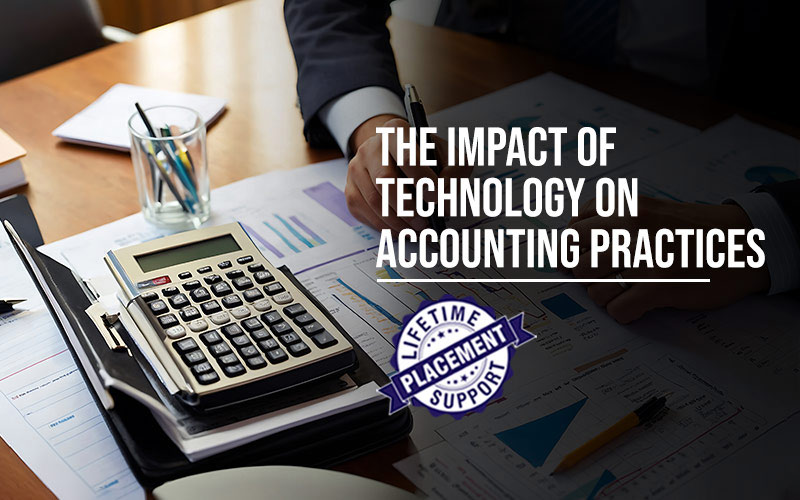The Impact of Technology on Accounting Practices

Table of Contents
# Enhanced Accuracy and Compliance
# Data Analytics and Decision-Making
The accounting industry has always been rooted in precision, accuracy, and meticulous record-keeping. With the advent of technology, the landscape of accounting has undergone a significant transformation. Innovative tools and software have streamlined processes, improved accuracy, and allowed accountants to focus more on strategic decision-making. This blog explores the various ways technology is revolutionizing the accounting process.
Automation and Efficiency
One of the most profound impacts of technology on accounting is the automation of routine tasks. Tasks that once required hours of manual effort can now be completed in a fraction of the time using accounting software. Automation tools handle data entry, invoice processing, payroll, and reconciliation with remarkable speed and accuracy. Join an institute of account & taxation training to learn more.
For instance, cloud-based accounting software like QuickBooks, Xero, and FreshBooks automatically syncs financial data from bank accounts, credit cards, and other financial institutions. This real-time synchronization reduces the risk of human error and ensures that financial records are always up-to-date.
Automation not only saves time but also frees accountants from mundane tasks, allowing them to focus on more strategic activities such as financial analysis, forecasting, and advising clients on financial planning.
Enhanced Accuracy and Compliance
Accuracy is paramount in accounting, and technology plays a crucial role in minimizing errors. Advanced accounting software comes equipped with built-in error-checking algorithms that identify discrepancies and inconsistencies in financial data. This reduces the likelihood of mistakes and ensures that financial statements are accurate and reliable.
Moreover, technology helps ensure compliance with ever-changing regulations and standards. Automated systems are regularly updated to reflect the latest tax laws, accounting standards, and compliance requirements. This ensures that businesses remain compliant and avoid costly penalties associated with non-compliance.
Data Analytics and Decision-Making
The integration of data analytics into accounting has revolutionized decision-making processes. Accountants can now leverage powerful analytics tools to gain insights from vast amounts of financial data. These tools analyze patterns, trends, and anomalies, providing valuable insights that inform strategic decisions.
Predictive analytics, for example, can forecast future financial trends based on historical data. It is an important subject in taxation training courses in Kolkata. This allows businesses to anticipate potential challenges and opportunities, enabling proactive decision-making. By analyzing key performance indicators (KPIs) and financial metrics, accountants can provide actionable recommendations to improve business performance.
Cloud Computing
Cloud computing has transformed the way accounting firms operate. Traditional accounting systems required on-premises servers and extensive IT infrastructure. Cloud-based accounting solutions, on the other hand, offer flexibility, scalability, and accessibility.
With cloud computing, financial data can be accessed from anywhere, at any time, using any device with an internet connection. This remote access is particularly beneficial for businesses with multiple locations or remote teams. It also facilitates collaboration between accountants and clients, as they can share and review financial information in real-time.
Cloud-based accounting solutions also offer robust security measures, including encryption and regular data backups, ensuring that financial data is protected from cyber threats and data loss.
Artificial Intelligence and Machine Learning
Artificial Intelligence (AI) and Machine Learning (ML) are transforming the accounting landscape by enhancing automation and decision-making capabilities. Any ITI institute will include this in their syllabus. AI-powered tools can process large volumes of data quickly and accurately, identifying patterns and anomalies that may go unnoticed by humans.
For example, AI can detect fraudulent transactions by analyzing transaction patterns and flagging suspicious activities. This helps in preventing financial fraud and safeguarding company assets. Additionally, AI-driven chatbots can handle routine client inquiries, providing instant responses and freeing up accountants to focus on more complex tasks.
Machine learning algorithms continuously improve over time by learning from historical data. This means that accounting processes become more efficient and accurate as the system adapts and evolves.
Blockchain Technology
Blockchain technology, known for its association with cryptocurrencies, is making its mark in accounting. Blockchain offers a decentralized and immutable ledger system, providing a transparent and secure way to record transactions.
In accounting, blockchain can enhance the integrity and transparency of financial records. Each transaction is recorded in a block, and once added to the blockchain, it cannot be altered. This ensures the accuracy and reliability of financial data, reducing the risk of fraud and manipulation.
Blockchain also streamlines the auditing process. Auditors can access real-time, tamper-proof records, making audits more efficient and reducing the time and cost associated with traditional auditing methods.
Conclusion
As technology continues to evolve, the future of accounting looks promising. Emerging technologies such as robotic process automation (RPA), advanced analytics, and augmented reality (AR) are set to further revolutionize the industry.
RPA can automate even more complex accounting tasks, while advanced analytics will provide deeper insights into financial data. AR has the potential to create immersive financial reports and presentations, making it easier for stakeholders to understand financial information.
In conclusion, technology is reshaping the accounting process, bringing about increased efficiency, accuracy, and strategic value. As accountants embrace these technological advancements, they can move beyond traditional number-crunching roles and become trusted advisors, guiding businesses towards success in an increasingly digital world.